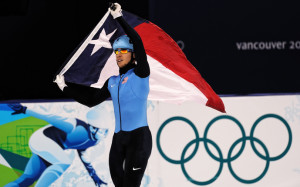Jordan Malone, Dyslexic Olympian Speedskater
Written by Sandie Barrie Blackley, Speech-Language Pathologist
Published on February 19, 2014
 For the past few weeks, the world has tuned in to the 2014 Winter Olympics, with many children discovering their new role model in an Olympic all-star. These phenomenal athletes are the best at what they do, but that doesn’t mean they haven’t had to overcome their own set of personal obstacles.
For the past few weeks, the world has tuned in to the 2014 Winter Olympics, with many children discovering their new role model in an Olympic all-star. These phenomenal athletes are the best at what they do, but that doesn’t mean they haven’t had to overcome their own set of personal obstacles.
Take US short-track speed skater Jordan Malone for example. The self-proclaimed “scrawny” kid from Texas overcame dyslexia and ADHD to represent his country in Sochi this year.
Though Malone has struggled in the classroom, he has excelled in the rink. “Skating seems to be one of the only things that allows me to block out the rest of the world. Even when I am just sitting down doing paperwork, I have to have a set of headphones in or I simply cannot focus. When I skate nothing else bothers me,” he said.
Malone is a great example of the connection between athletics and the ability to learn.
In her article for the Yale Center for Dyslexia & Creativity, “Sports: Strengthening Their Self Confidence and School Skills,” Nancy Hall makes the point that “physical activities like individual or team sports, important for any child, are especially beneficial for those with dyslexia.”
Hall goes on to offer helpful stories illustrating her point — examples in which youth who struggle with dyslexia offset some aspect of their difficulty with success in sports. Issues of self-esteem, frustration, motivation, relationships and even organization can be improved through athletics and such improvements can give students the confidence they need to continue making progress on the academic side.
When a child struggles to read, write or spell, it’s easy for life to fall out of balance — for the child and the family to turn a laser focus on “fixing” the problem at the expense of just about everything else, including play, fun, and recreation.
Getting a professional evaluation and finding an effective treatment is essential, and as Nancy Hall describes, sports can provide vital balance for a child with dyslexia whose daily, structured literacy practice requires a lot of focusing on words. Read the whole article here.
If your child struggles with reading, writing, or spelling, the most important first step is a professional evaluation. No matter where you live, your child can be tested and treated individually, face-to-face, online, by the clinical educators at Lexercise. Contact us to schedule a free consultation with one of our dyslexia therapists today.
Improve Your Child’s Reading
Learn more about Lexercise today.
Schedule a FREE
15-minute consultation


